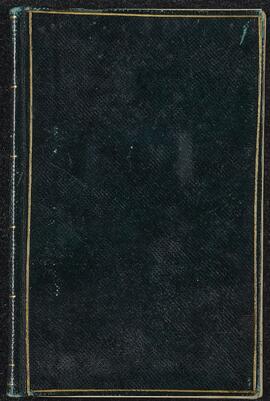This collection contains material created and generated by the Armstrong and Kemmis families during their ownership of Moyaliffe House, county Tipperary, and includes both administrative records and personal documents. Seventeenth-century material is scarce and limited in the main to leases of small pockets of land in counties Tipperary and Limerick. A more unusual item from this period is the satirical manuscript poem On the Bill of Conformity (P6/2137), attributed to Henry Hall, one of only sixteen known copies in the world. Eighteenth-century administrative records are mainly of financial and legal nature and arise from the badly managed affairs of William Armstrong (1704-1768), which affected his brother, the Reverend John Armstrong, who succeeded to the estate. Of personal items, the collection of early eighteenth-century sermons (P6/375-P6/427) attributed to the Reverend Edward Armstrong, the Reverend John Armstrong and others is of particular interest.
The nineteenth-century administrative material relates predominantly to the management of the Moyaliffe estate, and the succession to and management and eventual disposal of the family’s estates in Mayo and Sligo. There are also some clerical records of interest, most notably material relating to tithe wars of the 1830s (P6/758-P6/766 and P6/789-P6/813), and the state of dilapidation of the Mansion House of the See of Tuam discovered after the death, in 1819, of the Most Reverend Honourable William Beresford, first Baron Decies, Archbishop of Tuam, whose daughter Catherine was married to the Reverend Willam Carew Armstrong (1791-1847) (P6/850-P6/860).
By far the most voluminous, and perhaps the most interesting, part of the collection is that relating to the twentieth century. The administrative records in this section are in the main concerned with the management not only of Moyaliffe House but also of Ballinacor, county Wicklow, home of Captain William Daryl Olphert Kemmis. There is also a large quantity of material relating to Moyaliffe Stud (P6/1547-P6/1595), and to the problem of succession to the Moyaliffe and Ballinacor estates following Captain Kemmis’s death without issue in 1965 (P6/1812-P6/1834). On the personal side, the extensive correspondence of Rosalie Armstrong and her daughter Jess provide a unique insight into the genteel Anglo-Irish lifestyle and the irrevocable changes wrought upon it by the onset of the First World War. Of unique significance are the letters of Captain Kemmis to his father (P6/1475-P6/1479), and the letters and diaries of Captain William Maurice (‘Pat’) Armstrong written during the First World War (P6/1209-P6/1212 and P6/1414-P6/1418), providing first-hand accounts of events as they unfolded in the various theatres of war.
The twentieth-century material was roughly arranged by Jess Kemmis, who also appears to have destroyed some of it for personal reasons. Items thus lost included letters written by her niece, Bettyne Spencer (née Everard), to justify her actions during the Moyaliffe House dispute (for which see P6/1821-P6/1831). The letters were destroyed by Mrs Kemmis because she felt her niece’s views to be wrong. Also missing are Jess Kemmis’s diaries for the years 1955-1982 which she is known to have kept assiduously with the view to their permanent preservation within the family papers.
Jess Kemmis provided many explanatory notes and dates relating to the Armstrong Papers and the people and events to which they relate. These notes, which can be found scattered throughout the collection, should be treated with due caution as most, while well-intentioned and often helpful, can be misleading or inaccurate, written as they were in advanced old age.
Armstrong family of Moyaliffe, County Tipperary